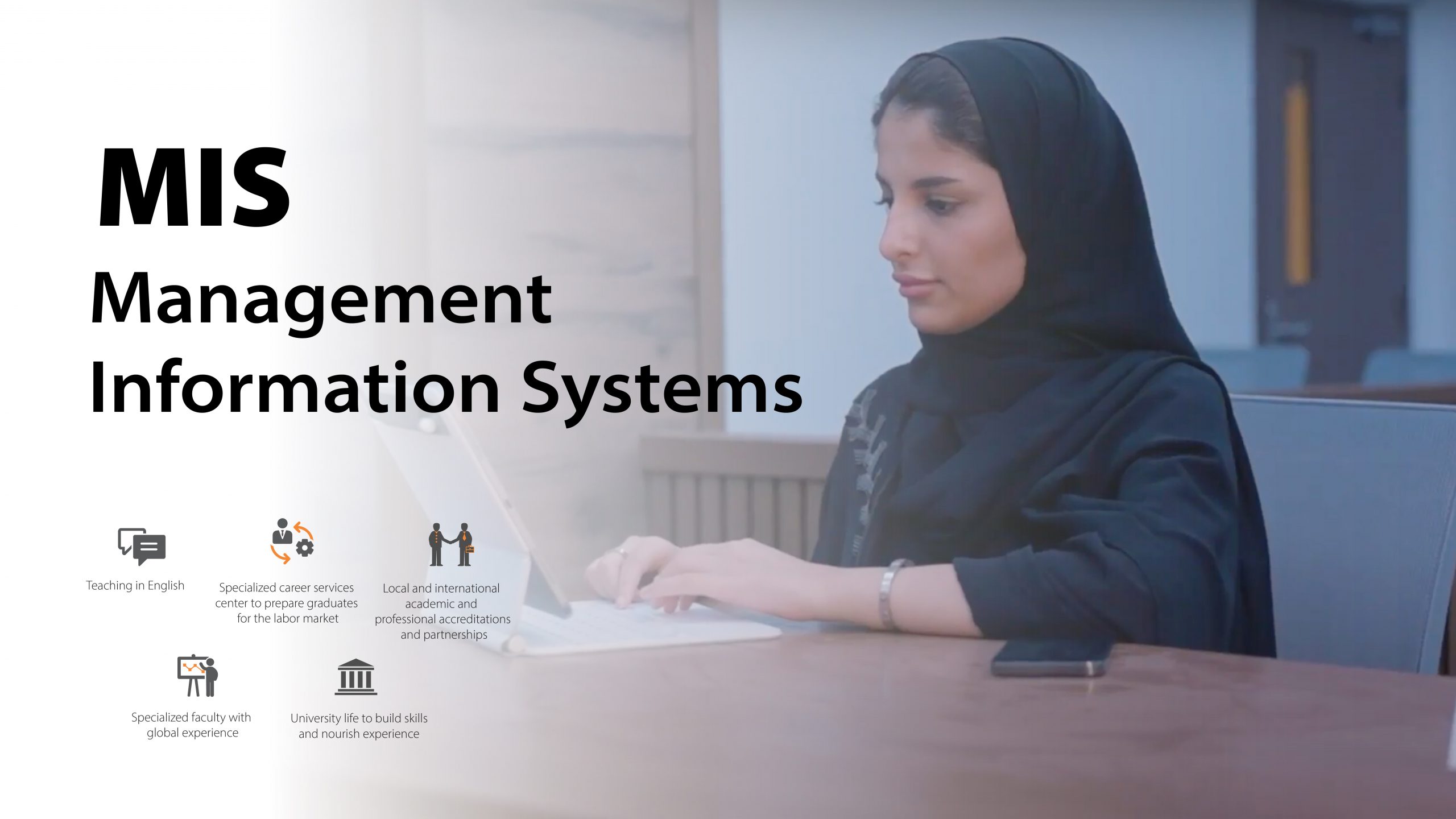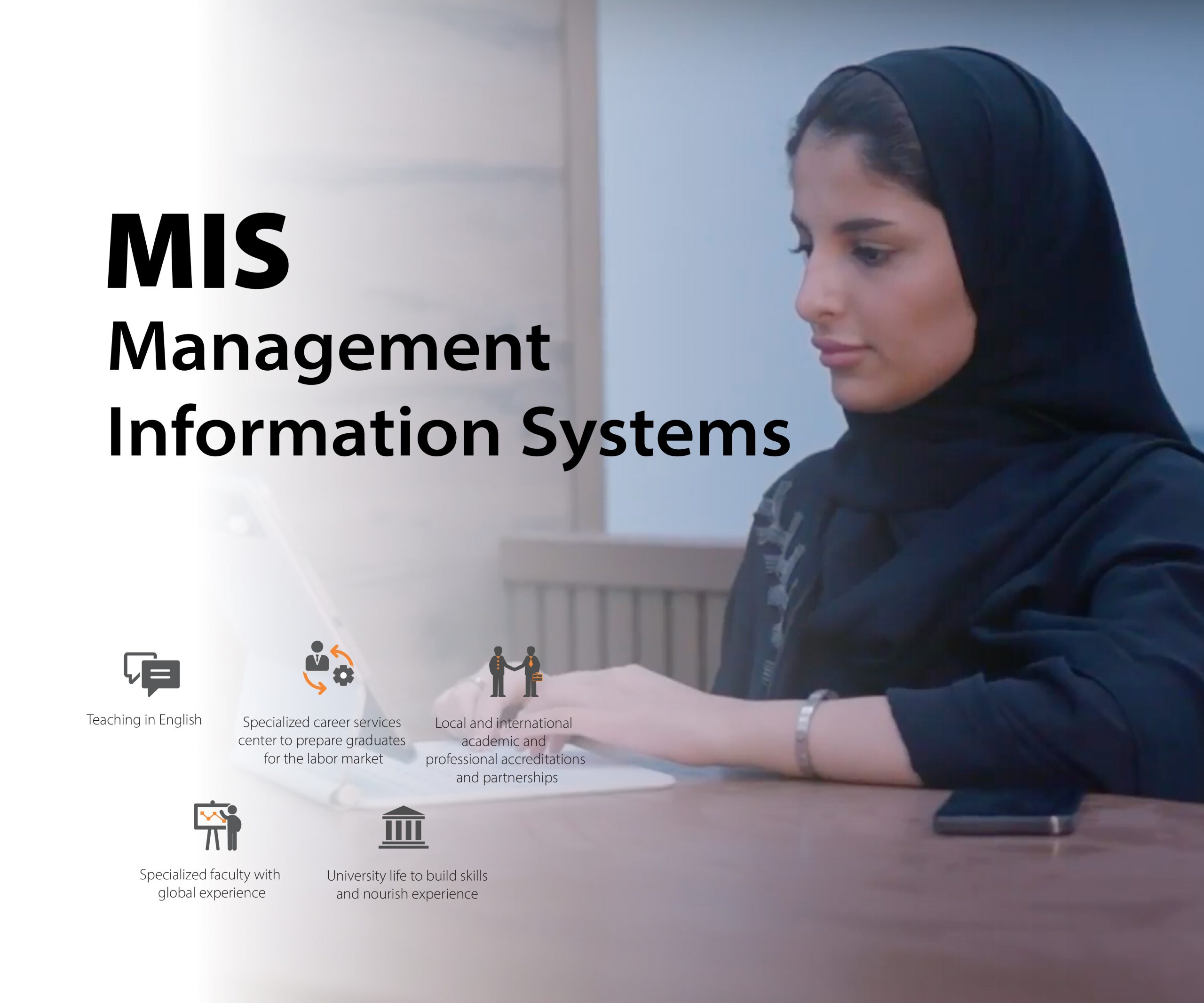Course Description of the MIS Major Core Courses
MIS 316: Programming Fundamental I (3-2-4)
Java’s unique architecture enables programmers to develop a single application that can run across multiple platforms. In this course, students gain experience with Java and its object-oriented features. The course is to cover the basic and intermediate concepts of object-oriented programming. Topics include the use of numerical data, primitive data types, selection statements, repetition statements, methods, arrays, standard classes, an instance of a class, and object-oriented programming. Prerequisite: MIS 201.
MIS 317: Fundamental of Web Design (3-0-3)
This course is designed to explore advanced and modern concepts and technologies used in the development of electronic business applications. It introduces basic concepts of the Internet and the World Wide Web. Students will learn how to create web pages with HTML and use JavaScript for dynamic effects. Major topics include the roles and operation of web browsers and servers, including interacting with web applications through forms, the separation of formatting and logical structure in HTML documents, stylesheets, and the basic principles of effective interface design for the web. Prerequisite: MIS 316.
MIS 326: System Analysis and Design (2-2-3)
Focuses on the application of information technologies (IT) to system life cycle methodology, systems analysis, systems design, and system implementation practices. Covers methodologies related to the identification of information requirements, feasibility in the areas of economic, technical, and social requirements, and related issues are included in course content. Software applications may be used to enhance student skills. Prerequisite: MIS 316.
MIS 327: Database Management and Design (2-2-3)
This course is an introductory course to database management systems and design. It practices various steps of database-driven application development such as modeling, design, querying, and implementation. The course also covers the design of database systems, important database theory, SQL, programming, and relational databases. Prerequisite: MIS 316.
MIS 328: Business Telecommunications (2-2-3)
This course deals with various issues like the importance of networks in the modern organization, explains how information is moved through a network and describes network hardware, software, and protocols in terms of the functions of the TCP/IP (5 layers) and the OSI (7 layers) network models and other related issues. Prerequisite: MIS 201.
MIS 329: Decision Support and Business Intelligence (3-0-3)
The course is designed to extend students’ skills and expertise in developing, managing, and using Decision Support Systems and Business Intelligence Tools. This course will examine the design, development, and implementation of information technology-based systems that support managerial and professional work, such as Data Warehouses, Business Reports, Neural Networks, Expert Systems, and Big Data. Prerequisite: MIS 327.
MIS 423: Web-Based Application (2-2-3)
This course is to explore advanced and modern concepts and technologies used in the development of electronic business applications. It introduces basic concepts of the Internet and the World Wide Web. Students will learn how to create web pages with HTML and use JavaScript for dynamic effects. Major topics include the roles and operation of web browsers and servers, including interacting with web applications through forms, the separation of formatting and logical structure in HTML documents, stylesheets, and the basic principles of effective interface design for the web. Prerequisite: MIS 317 and MIS 327.
MIS 427: Information Security and Risk Management (2-2-3)
This course provides a comprehensive study into a broad selection of contemporary information systems security issues, concepts, and policies, including a survey of the state-of-the-art technology used to address security problems. Topics of study include core security mechanisms of access control and integrity, basic cryptography techniques, assurance, authentication, digital signatures, and database security mechanisms. The course discusses security policy and privacy issues for information systems protection and detection, as well as an overview of recent trends in commercial products and applications and security research in basic network security, and intrusion detection. Prerequisite: MIS 328.
MIS 431: Project Management (3-0-3)
Projects are an increasingly important aspect of modern business. This course develops a foundation of concepts and solutions that supports the planning, scheduling, controlling, resource allocation, and performance measurement activities required for the successful completion of a project. The course also discusses the technical, cultural, and interpersonal skills necessary to successfully manage projects from start to finish. A special focus will be given on effective leadership in typically quite heterogeneous teams, on organization and risk management, defining success factors and those factors that contribute to time and cost overruns and potentially to the failure of a project. Prerequisite: MIS 326.
MIS 492: MIS Senior Project (3-0-3)
The MIS 492 Senior Project is a three-credit group research or design project that students undertake under the guidance of a faculty member from the MIS area. The senior project may include but is not limited to proposing methods to handle the management of information systems issues, forecasting or case study. As well, it may include data science projects, statistical modeling of big data, machine learning, experts’ systems, Decision Support Systems, privacy, ethics, and governance issues. Prerequisite: 104 credits.
MIS 498: COOP Training Internship (6-0-6)
The coop is an internship training that is required for all business students, and it is an integral part of their BSBA degree requirements. It is intended to bridge the gap between theory and practice and provide business students with a hands-on experience in their field of study. In the coop training, business students will have the opportunity to apply theories, models, and knowledge that they have learned throughout their undergraduate program to real-world environments. This will sharpen their skills and enhance their chances to land permanent quality employment. Prerequisite: 121 Credit Hours.
Course Description of the MIS Major Elective Courses
MIS 428: Healthcare Information Systems (3-0-3)
This course is an introduction to the fundamentals of health information management, and it addresses key issues in contemporary healthcare IT, including electronic health records, smartphones, tablets, and their healthcare applications. As well, it covers key healthcare information technologies, healthcare data and analytics, electronic health records (EHR), and new trends in healthcare management with an emphasis on health information security. Prerequisite: MIS 329.
MIS 429: Data Mining and Analysis (3-0-3)
The course is about the fundamental concepts of data mining. It provides a comprehensive discussion of how data mining techniques and methodologies enable decision-makers to solve business problems. The course will provide an in-depth explanation of the conceptual and application issues in the area of data mining. The major focus, however, is given to the methodologies and applications, not to their mathematical foundations. Prerequisite: MIS 329.
MIS 430: Advanced Topics of Information Systems (3-0-3)
This course provides broad perspectives on advanced topics in information systems, such as Enterprise Systems, artificial and business intelligence, and online business models. It also focuses on IS development (e.g., methodologies, approach, techniques), and highlights the difficulties and challenges of IS implementation. Prerequisite: MIS 329.
MIS 432: Enterprise Systems (2-2-3)
This course will introduce enterprise systems and show how organizations use enterprise systems to run their operations more efficiently and effectively. Topics to be covered are architecture, setup, configuration, operations, and management of a system that is of “enterprise-class, CSFs, implementation strategies. The course will also examine typical Enterprise Systems modules, such as MM, SCM, CRM, etc. Prerequisite: MIS 327.
MIS 433: Internet Business and Web Application Development (3-0-3)
Integrates topics of management and organization theory, information and communication theory, and systems theory relevant to managing an organization’s information resources. Includes computer hardware and software, telecommunications, and database concepts and emphasizes the e-commerce and Internet-based business models to get competitiveness of global-based business environments. Prerequisite: MIS 316.
MIS 434: Human Resource Information Systems (3-0-3)
This course introduces the fundamental concepts of Human Resource Information Systems (HRIS): Strategic role of Human Resource Information Systems (HRIS) in the effective management of organizations, HRIS capabilities and limitations, Organizational needs for HRIS, Evaluation and selection factors of an appropriate HRIS, HRIS software application packages for management decision-making. Role of HRIS in current Information Technology topics (Internet, Privacy, Security). Prerequisite: MIS 329.
MIS 435 Knowledge Management Systems (3-0-3)
This course provides an introduction to Knowledge Management (KM) theory, issues, and developments. Human elements relating to organizational culture and learning are the focus for examining models for knowledge creation, taxonomies, and sharing. This course, therefore, is Introduction to Knowledge Management (KM) as a tool to gain a competitive advantage. KM for innovation, KM’s emerging systems (Enterprise 2.0, Semantic Web), E-Knowledge Management, and KM Development Methods. Prerequisite: MIS 201.
MIS 436 Mobile Computing (3-0-3)
Developing apps can be fun and is potentially lucrative but it is also quickly becoming a core skill in the information technology field. Businesses are increasingly looking to mobile apps to enhance their relationships with their customers and improve their internal processes. The course will allow students to explore various challenges and opportunities of mobile computing, including topics, such as wireless network protocols and standards, location awareness, sensing, user interfaces, application development, and security/privacy concerns. Prerequisites: MIS 317 and MIS 326.



